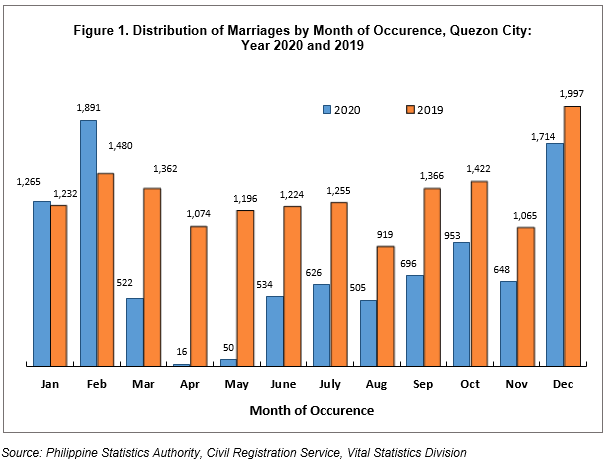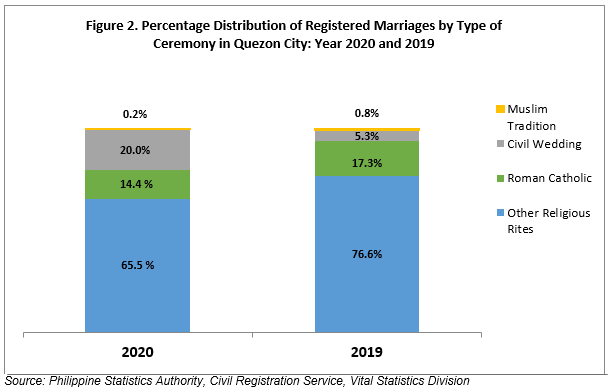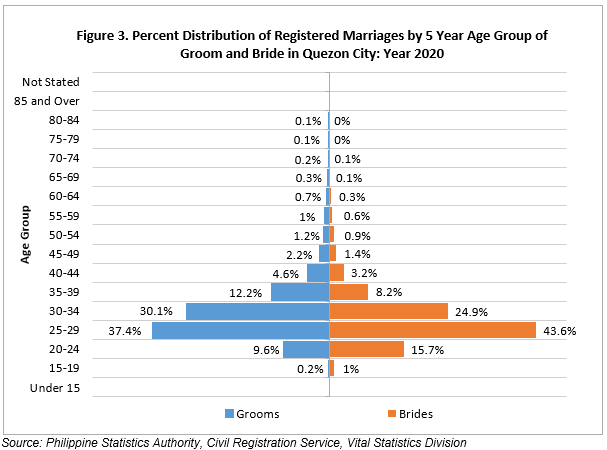Civil Registration is a continuous, permanent and compulsory recording of vital events occurring in the life of an individual such as birth, marriage and death as well as court decrees, and legal instruments affecting the civil status of an individual in appropriate registers as mandated by Act no. 3753, the Civil Registry Code.
This special release presents data on marriage statistics which occurred in year 2020. Statistics were based on the marriages registered in Quezon City. The data on the number of marriages presented in this regular annual release were obtained from the vital events registered either timely or belatedly, at the City Civil Registry Office of Quezon City.
Marriages
Registered marriages in Quezon City decreases by 39.6 percent
There were 9,420 marriages recorded in Quezon City for the year 2020, recording a decrease of 39.6 percent from the 15,592 figure of the previous year.

Out of the total marriages, 9,089 or 96.5 percent were registered timely while 331 or 3.5 percent were registered late. This data recorded a minimal difference with the percentage of timely and late registered marriages for 2019 with 95.5 percent and 4.5 percent respectively. (Table 1)
February posted the highest number of marriages in 2020
The highest number of marriages in 2020 occurred in February at 1,891 or 20.1 percent, followed by December with 1,714 or 18.2 percent and January with 1,265 or 13.4 percent of the total marriages. Meanwhile, April and May recorded the least number of marriages with 16 or 0.2 percent and 50 or 0.5 percent, respectively.

On the other hand, the highest number of marriages on the previous year was recorded in the month of December with 1,997 or 12.8 percent of the total marriages. (Table 2)
Two in three marriages are solemnized through other religious rites
To categorize the religion of the solemnizing officers who officiated the wedding ceremonies, generated data showed that 65.5 percent of the total marriages were solemnized through Other Religious Rites. This is lower than the percentage of the same category recorded on 2019 with 76.6 percent.

Other significant matrimonial ceremonies were officiated by Roman Catholic Church with 14.4 percent, Civil Wedding with 20.0 percent and Muslim Tradition with 0.2 percent. Out of the four types of ceremony, only the Civil showed an increase of 127.0 percent based on the number of registered marriages from 829 on 2019 to 1,880 on 2020. (Table 3)
Women marry at an early age than men
In Quezon City, the median age of marriage for grooms and brides are 30 and 28, respectively. The median ages are exactly the same as in the previous year. (Table 4)

Most men and women marry at the age of 25 to 29
The highest frequency of marriages in year 2020 for grooms was at the age group of 25 to 29 corresponding to 3,525 grooms or 37.4 percent. On the other hand, the highest frequency for brides was also at the age group of 25 to 29 corresponding to 4,109 brides or 43.6 percent of the total marriages.

Teenage marriages
There were 94 or 1.0 percent of the registered brides and 23 or 0.2 percent of the registered grooms enter the wedding ceremony at the age of 19 years old and below in the period of 2020. (Table 4)
EXPLANATORY NOTES
Introduction
Vital statistics are derived from information obtained at the time when the occurrences of vital events and their characteristics are inscribed in a civil register.
Vital acts and events are the births, deaths, fetal deaths, marriages, and all such events that have something to do with an individual's entrance and departure from life together with the changes in civil status that may occur to a person during his lifetime. Recording of these events in the civil register is known as vital or civil registration and the resulting documents are called vital records.
Definition of terms and concepts
Significant terminologist and descriptions in the foregoing highlights and tables are defined below. Included are some items found in the certificates and summary measure used in describing the facts of events.
Marriage is a contract of permanent union between a man and a woman entered into in accordance with law for the establishment of conjugal and family life.
Daily Average refers to the arithmetic mean of marriage occurrences per day.
Sex Ratio refers to the number of males per one hundred females.
Usual Residence refers to the place where the person habitually or permanently resides.
Place of Occurrence refers to the place where the vital event took place.
Content and Coverage of Publication
This report contains statistical tables and the highlights covering one of the vital events - marriages
(SGD) APOLINAR F. OBLEA
Chief Statistical Specialist
